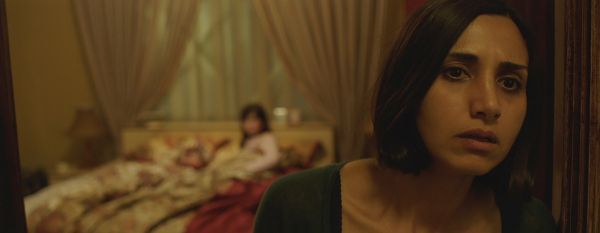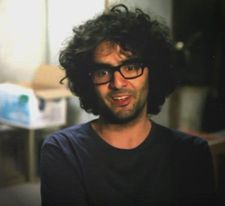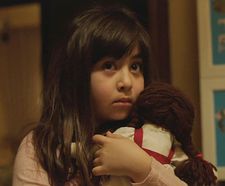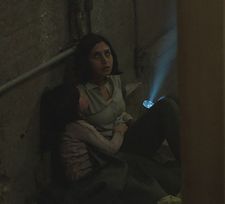 |
| Babak Anvari: 'I think the less you see, the scarier it is' |
AW: Given the number of conflicts you could have chosen in the Middle East, you picked the Iran-Iraq War, why was that?
BA: It's because I was born in Iran and grew up in Iran and I experienced that war so out of all those conflicts it's the one I knew most about, so it made sense. I arrived in the middle of it, so by the time it ended I was five or six years old, so more or less the same age as Dorsa is in the film. I was living in Tehran – I left when I was 19.
AW: It must have been pretty bloody awful to be a small child there at that time.
 |
| Babak Anvari Photo: Courtesy of Sundance Film Festival |
AW: Do you think you did that?
BA: I think so. That was one of the main inspirations behind Under The Shadow. I was thinking back about that era and about the horrors of it and how, as a child, it was difficult to understand what was going on and that was definitely one of the drivers for the film.
AW: It's interesting that you've picked the djinn as the bad guy. It's normally the sort of thing you come across in novels rather than on-screen, so that was really interesting. Did you grow up with stories about the djinn?
BA: Yes, the djinn is a very Middle Eastern myth and every Middle Eastern country has its own take on it. When I was a child I used to love all these urban legends about djinn being in old derelict buildings. I even had a friend in primary school who used to tell me all these stories about djinn. So, basically, it was always in the back of my mind. As a child I used to listen to all of those stories, it was around the same time as the war, so it made sense.
AW: It's a good bad guy in that its non-corporeal a lot of the time. Was the fact you could be more suggestive with it in your mind?
BA: One hundred per cent. I think the less you see, the scarier it is. That's always the case and they're my favourite horror films. Even when you watch something like the first Alien, you barely see the alien and it's terrifying. Once you see the monster, it's no longer scary, especially in Under The Shadow because it's quite ambiguous – even the main character doesn't know if it's really happening to her or if she's imagining it.
AW: Sound is very important to the film, for example the audience really jump when toast pops up at one point.
 |
| Babak Anvari: 'I realised there is no way that you can make a plastic doll not look creepy' |
AW: You choose to use quite an innocuous looking doll. They're such a stock item in horror movies, did you agonise over how to make that non-threatening – usually people are trying to do the opposite?
BA: Basically, I just wanted to make sure that the doll doesn't look creepy – that she looks innocent and cuddly. In the script, I wrote her as a plastic doll, but closer to the time I realised there is no way that you can make a plastic doll not look creepy. So I decided that she had to be a rag doll because of that cliché that dolls are creepy.
AW: You inject some humour with the Jane Fonda workout video that crops up through the film. Was your mum a Jane Fonda fan?
BA: She did actually do that. We had a neighbour who was a health freak and she used to give her all these Jane Fonda videos and say, 'You should do this exercise'. So I remember that and that's why I put it in.
AW: How hard was it to cast the character of Dorsa.
BA: I saw 10 or 12 children and as soon as Avin Manshadi walked in the room, I realised she was the one because she's super-smart, creative and talented. Obviously, it's the first time she acted in front of the camera. There's an Iranian school in London, Rustam School, it does weekend classes for children who are from an Iranian background but brought up in London, but whose parents don't want to forget the language. So we contacted them. I had good relationship with them because they helped me with my short film Two & Two. The difficult bit came after when I said: 'This is the one.' Then we realised she and her family are refugees and they didn't have passports. Fortunately, the producers worked their magic and we managed to get her into Jordan.
AW: When you making a film like this with a child are you conscious of the fact that you don't want to frighten them in the process.
BA: I always made sure that she knew it was like a role play and not being serious. Avin is super-smart so she knew it was all make believe. So it wasn't that difficult and she picked up things really quickly.
AW: How did you cast the other actors – especially because they have to work well with the children.
 |
| Babak Anvari: 'We started experimenting with sound and then we took it to the sound designers who really enhanced it and made it more effective' |
AW: Do you see yourself continuing to make Iranian films or not?
BA: No, it made sense for this very personal story but I don't want to just make films in Farsi. The next film definitely won't be in Farsi, I've got that out of my system at least for now.
AW: Will it be horror?
BA: No I want to show variety. I don't want to get pigeon-holed as a horror director. I'm not going to rush into things and ruin my career. A lot of directors you see after they do their first or second film, then go and do an awful romantic comedy, just for money and hopefully I'm not going to do that... although it depends how much they offer.
Under The Shadow opened New York's New Directors/New Films on March 16. It will be distributed globally by Vertical Entertainment and XYZ Films. The film will be in cinemas in the UK on September 30.





















